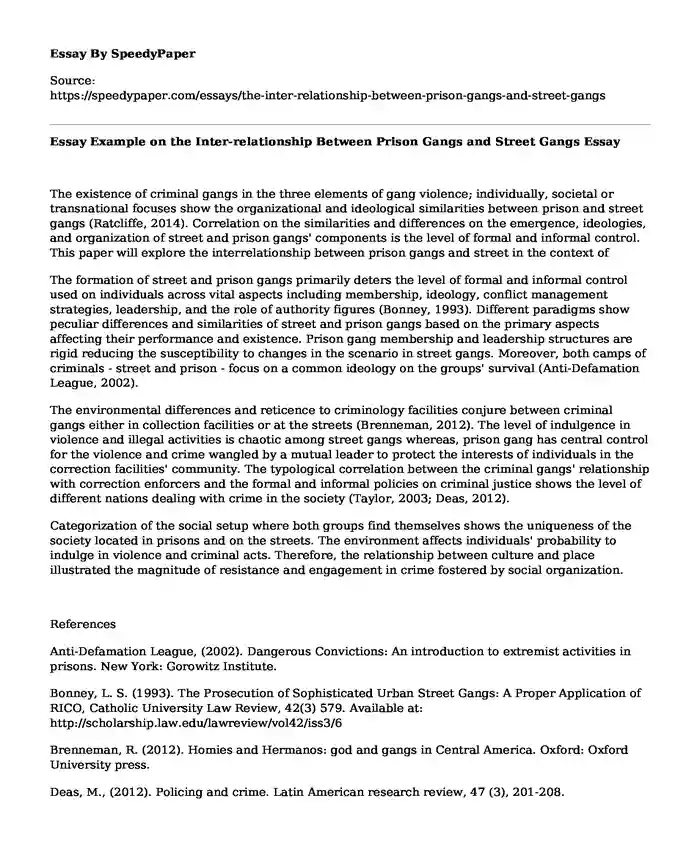The existence of criminal gangs in the three elements of gang violence; individually, societal or transnational focuses show the organizational and ideological similarities between prison and street gangs (Ratcliffe, 2014). Correlation on the similarities and differences on the emergence, ideologies, and organization of street and prison gangs' components is the level of formal and informal control. This paper will explore the interrelationship between prison gangs and street in the context of
The formation of street and prison gangs primarily deters the level of formal and informal control used on individuals across vital aspects including membership, ideology, conflict management strategies, leadership, and the role of authority figures (Bonney, 1993). Different paradigms show peculiar differences and similarities of street and prison gangs based on the primary aspects affecting their performance and existence. Prison gang membership and leadership structures are rigid reducing the susceptibility to changes in the scenario in street gangs. Moreover, both camps of criminals - street and prison - focus on a common ideology on the groups' survival (Anti-Defamation League, 2002).
The environmental differences and reticence to criminology facilities conjure between criminal gangs either in collection facilities or at the streets (Brenneman, 2012). The level of indulgence in violence and illegal activities is chaotic among street gangs whereas, prison gang has central control for the violence and crime wangled by a mutual leader to protect the interests of individuals in the correction facilities' community. The typological correlation between the criminal gangs' relationship with correction enforcers and the formal and informal policies on criminal justice shows the level of different nations dealing with crime in the society (Taylor, 2003; Deas, 2012).
Categorization of the social setup where both groups find themselves shows the uniqueness of the society located in prisons and on the streets. The environment affects individuals' probability to indulge in violence and criminal acts. Therefore, the relationship between culture and place illustrated the magnitude of resistance and engagement in crime fostered by social organization.
References
Anti-Defamation League, (2002). Dangerous Convictions: An introduction to extremist activities in prisons. New York: Gorowitz Institute.
Bonney, L. S. (1993). The Prosecution of Sophisticated Urban Street Gangs: A Proper Application of RICO, Catholic University Law Review, 42(3) 579. Available at: http://scholarship.law.edu/lawreview/vol42/iss3/6
Brenneman, R. (2012). Homies and Hermanos: god and gangs in Central America. Oxford: Oxford University press.
Deas, M., (2012). Policing and crime. Latin American research review, 47 (3), 201-208.
Ratcliffe, J. H. (2014). Central American police perception of street gang characteristics, Policing and Society, Retrieved from http://dx.doi.org/10.1080/10439463.2014.942849.
Taylor, J. (2003). Racial Segregation in California Prisons, Loyola of Los Angeles Law Review, 37(1), 139 . Available at: http://digitalcommons.lmu.edu/llr/vol37/iss1/8.
Cite this page
Essay Example on the Inter-relationship Between Prison Gangs and Street Gangs. (2022, Mar 31). Retrieved from https://speedypaper.net/essays/the-inter-relationship-between-prison-gangs-and-street-gangs
Request Removal
If you are the original author of this essay and no longer wish to have it published on the SpeedyPaper website, please click below to request its removal:
- Free Essay Sample on Breaking a Negative Norm
- Museums of Houston, Free Essay for Your Inspiration
- Free Essay Describing the Assessment Strategy for Children and Families Module
- Free Essay for Everyone: Gender-Leader Association
- HR Management Essay Example: Performance Incentive Ideas
- Analysis of Methodologies, Assumptions and Sensitive Variables in Qualitative Evaluation: Essay Sample
- Essay Sample on Family Mementos or Stories Passed From Generation to Generation
Popular categories





